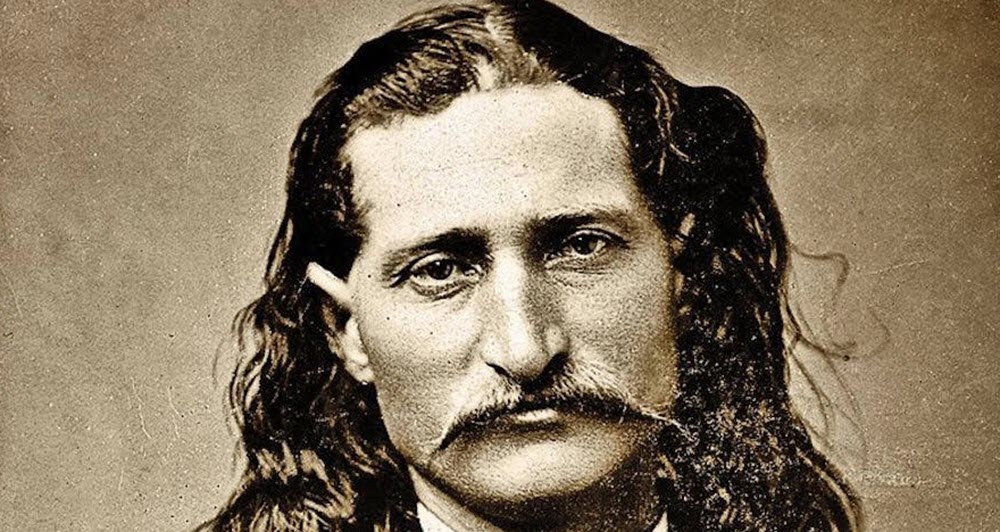Wild Bill Hickok
James Butler Hickok (1837-1876) was a folk hero of the American Old West and remains a popular and well-known figure of frontier history. Better known under his nickname Wild Bill Hickok, he was – among other things – a soldier, scout, lawman, gunman, marksman, gambler, actor, and showman.

Hickok was involved in several famous shootouts and claimed to have killed numerous gunmen, but according to Hickok´s biographer Joseph G. Rosa only six or possibly seven kills can be substantiated.
Hickok grew up on a farm in northern Illinois and headed west at the age of 18 – already a fugitive from justice. He worked in Kansas and Nebraska, which were then frontier territories, and during the American Civil War he spied for the Union Army.
Hickok died in 1876 in Deadwood, Dakota Territory (present-day South Dakota), at just 39 years of age. He was playing poker in a saloon when he was shot to death by the unsuccessful gambler Jack McCall. According to legend, Hickok was holding a two-pair poker hand at the time, consisting of black aces and eights. This hand is now known as Dead Man´s Hand.
Short facts about “Wild Bill” Hickok
Name: James Butler Hickok
Aliases: Wild Bill Hickok, Shanghai Bill, William Hickok, William Haycock
Birth: May 27, 1837, in Homer, Illinois, USA
Spouse: Agnes Thatcher Lake, married in 1876
Death: August 2, 1876, in Deadwood, Dakota Territory, USA
Grave site: Mount Moriah Cemetery, Deadwood
The David Tutt shootout
The Hickok – Tutt shouttout is one of few recorded instances in the Old West of a one-on-one pistol quick-draw duel in a public place. It occurred on July 21, 1865, in the town square of Springfield, Missouri, and the first published account of the event could be read in Harper´s Magazine in 1867. That article helped make Hickok a household name and Old West folk hero.
Background
In Springfield, Hickok had several disagreements with a local gambler named Davis Tutt. The hostilities between them chiefly concerned a combination of alleged unpaid gambling debts and them being rivals over the same women.
After losing to Tutt in a poker game, Hickok gave his opponent a gold watch as collateral for the debt but asked him to not wear it in public as it had great sentimental value to him.
When a group of men mocked Hickok and said that Tutt was planning to wear the watch “in the middle of town square” the next day, Hickok allegedly replied that “He shouldn’t come across that square unless dead men can walk”.
Negotiations break down
The next day, Tutt arrived to the square around 10 am with the watch openly hanging from his waist pocket. Within an hour, words about this had reached Hickok. According to the testimony of Eli Armstrong, Hickok went to the square and the two gamblers talked about settling the debt. Hickok claimed that he only owed $25, while Tutt stated that he should be paid $45. They then went for a drink together, but the conflict was not resolved.
The shootout
A few minutes before 6 pm that same day, Hickok was seen walking towards the square from the south, holding his Colt Navy. The people in the square took refuge in nearby buildings, not wanting to be caught in a shootout, but Tutt remained in the north-western corner of the square.
When the two men were roughly 75 yards from each other, Hickok stopped and yelled “Dave, here I am”. He cocked his Colt, holstered it on his hip and yelled “Don’t you come across here with that watch.” Tutt did not replay, but kept his hand on his pistol.
Both men faced each other sideways and hesitated briefly. Tutt reached for his gun, and Hickok drew his Colt and steadied it on his forearm. Each man fired a single shot. According to witnesses, they both fired at essentially the same time. Tutt´s shot missed, but Hickok´s bullet hit Tutt between the fifth and seventh rib on the left side of his body. Tutt yelled “Boys, I´m killed” and ran to the porch of the courthouse, before retuning to the street where he collapsed and died.
Aftermath
Hickok was arrested for murder two days later. The charge was reduced to manslaughter and he was released on a $2,000 bail. The trial took place on August 3, 1865. The jury voted to acquit Hickok; a verdict which sparked plenty of criticism and a public backlash.